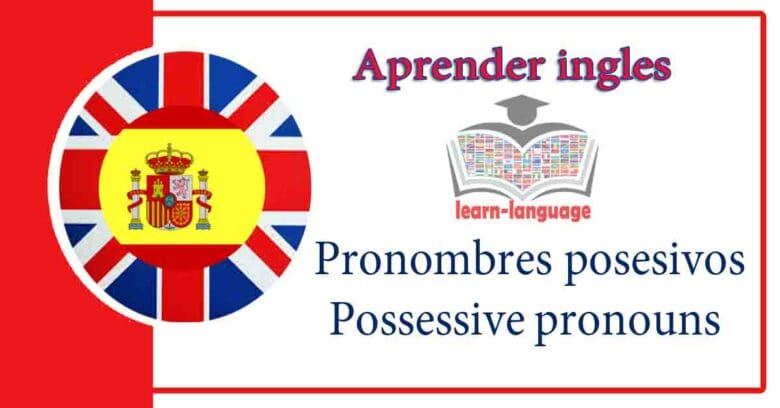Pronombres posesivos – Possessive pronouns – Aprender ingles

Pronombres posesivos – Possessive pronouns – Aprender ingles
- yo – mi
I – my - Yo no encuentro mi llave.
I can’t find my key. - Yo no encuentro mi billete.
I can’t find my ticket. - tú – tu
you – your - ¿Has encontrado tu llave?
Have you found your key? - ¿Has encontrado tu billete?
Have you found your ticket? - él – su
he – his - ¿Sabes dónde está su llave?
Do you know where his key is? - ¿Sabes dónde está su billete?
Do you know where his ticket is? - ella – su
she – her - Su dinero ha desaparecido.
Her money is gone. - Y su tarjeta de crédito también.
And her credit card is also gone. - nosotros /-as – nuestro(s) /-a(s)
we – our - Nuestro abuelo está enfermo.
Our grandfather is ill. - Nuestra abuela está bien.
Our grandmother is healthy. - vosotros /-as – vuestro(s) /-a(s)
you – your - Niños, ¿dónde está vuestro papá?
Children, where is your father? - Niños, ¿dónde está vuestra mamá?
Children, where is your mother? - las gafas
the glasses - (Él) ha olvidado sus gafas.
He has forgotten his glasses. - ¿Dónde están sus gafas?
Where has he left his glasses? - el reloj
the clock - Su reloj está estropeado.
His clock isn’t working. - El reloj está colgado en la pared.
The clock hangs on the wall. - el pasaporte
the passport - Ha perdido su pasaporte.
He has lost his passport. - ¿Dónde está su pasaporte?
Where is his passport then? - ellos /-as – su
they – their - Los niños no encuentran a sus padres.
The children cannot find their parents. - ¡Pero ahí vienen sus padres!
Here come their parents! - usted – su
you – your - ¿Cómo fue su viaje, señor Molinero?
How was your trip, Mr. Miller? - ¿Dónde está su mujer, señor Molinero?
Where is your wife, Mr. Miller?
Pronombres posesivos – Possessive pronouns
- usted – su
you – your - ¿Cómo ha sido su viaje, señora Herrero?
How was your trip, Mrs. Smith? - ¿Dónde está su marido, señora Herrero?
Where is your husband, Mrs. Smith? - Hola
Hello - Buenos días
Good morning - Buenas tardes
Good afternoon - Buenas noches
Good evening - Buenas noches
Good night - ¿Cómo está?
How are you? - Bien, gracias
Fine, thank you - ¿Y usted?
And you? - Bienvenidos
Welcome - Es un día bonito
It is a beautiful day - Tenga un buen día
Have a nice day - Adiós
Goodbye - Hasta luego
See you later - Hasta mañana
See you tomorrow - Perdón
Excuse me (when bumping into someone) - ¿Puedo ayudarle?
May I help you? - ¿Usted habla inglés?
Do you speak English? - Sí, un poco
Yes, a little - Sí
Yes - No
No - Mucho gusto en conocerlo
Nice to meet you - Mucho gusto en verlo
Nice to see you - Señor (el)
Mr. - Señora (la)
Mrs. - Señorita (la)
Miss
